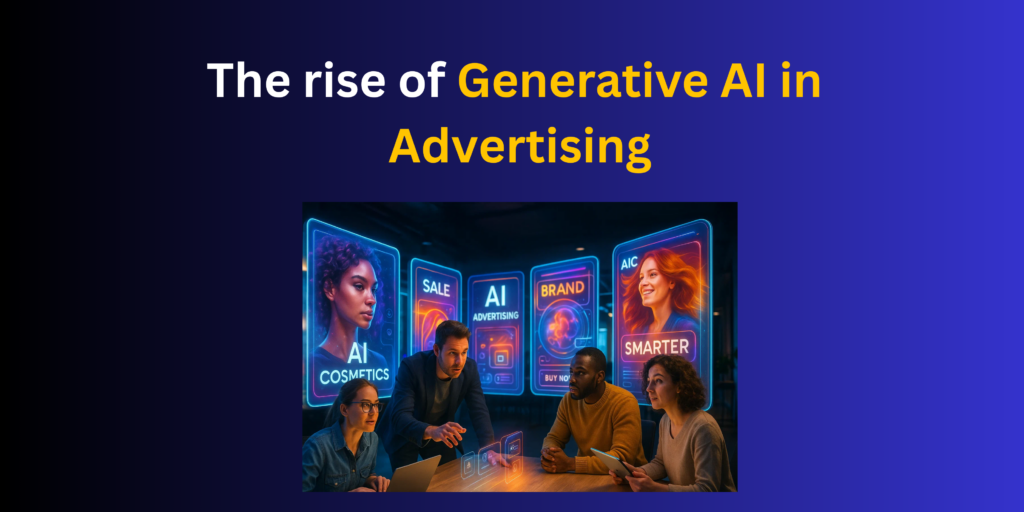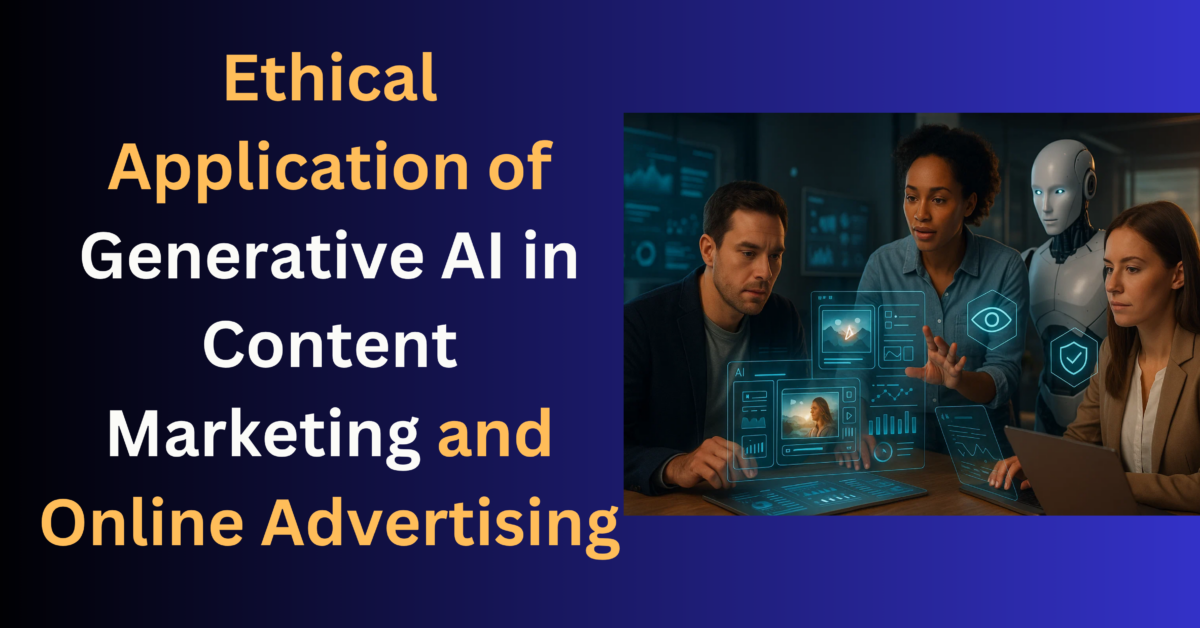Ethical Application of Generative AI in Content Marketing and Online Advertising
Generative AI technology is transforming the way brands produce content and market themselves online. Whether producing blog posts, ad copy, and social media posts, or creating images, video, and interactive experiences, generative AI speeds up production, facilitates personalization at scale, and reduces costs.
Ethical AI in digital marketing means creating, implementing, and maintaining AI systems that are fair, transparent, privacy-respecting, unbiased, and human-values-based. Setting up the keyword “ethical AI in marketing” from the beginning helps establish the context of the rest of the conversation, because as marketers embrace AI technology, the ethical component defines whether innovation fosters trust — or undermines it.
Customers are increasingly mindful of, and concerned with, how brands leverage AI. Misuse of data scandals, deceptive “deepfake” material, or AI results that further prejudice can harm brand value, attract regulatory sanctions, and sabotage customer confidence. Brands that pursue ethical AI in marketing practices, on the other hand, can reap a competitive edge, capture loyalty, and conduct business more efficiently.
The trick for today’s marketers is to reconcile innovation with responsibility and trust. We can set the boundaries of what’s possible with AI—but only if we’re anchored in ethical values.
Get More: Ultimate Guide to SEO with AI for Higher Google Rankings
Understanding Generative AI in Digital Marketing
What Is Generative AI in Content Creation?
Generative AI describes systems that are capable of generating fresh content—text, image, video, sound—sometimes in reaction to user input or to run processes. Some common tools are:
- Chatbots and conversational agents (for customer support, lead generation, or interactive content).
- AI content writers that are able to create blog posts, articles, product descriptions, social media updates, etc.
- Ad copy generators and headline tools that generate variation sets for A/B testing.
- Image/video generation tools, such as tools to create visuals from text-based input, or to convert visuals.
Use-case examples:
- A company uses AI to produce blog outlines, which are afterward edited by human editors.
- Sending targeted email campaigns where AI produces subject lines and body copy optimized by customer segment.
- Producing display or social ad creatives using AI-powered design software to generate variants in a hurry.
- Producing short video commercials or animations through AI tools that cut production time and expense.
It’s crucial to keep up with emerging digital marketing trends to watch in 2026 as AI continues to transform the way we produce and disseminate content. This will ensure that your brand strategy changes with these advancements.

The rise of Generative AI in Advertising
Generative AI advertising is expanding fast. The advantages for advertisers are impressive:
- Scale: With AI, it is possible to produce numerous variants (copies, designs) rapidly.
- Personalization: Messaging can be customized to individual tastes or segments in more automated fashion.
- Cost savings: Reduced expenses in content creation, less resource for repetitive creative efforts.
- Speed: Quicker turnaround from concept to delivery; instant iteration in campaign construction.
Where it’s widely applied:
- Display ads: Banner artwork, creatives, art assets created or modified through AI.
- Programmatic advertising: Targeting through automation, real-time bidding, dynamic creative optimization.
- Video campaigns: Employing AI tools for script writing, voice-overs, video editing, even creating video content or motion graphics.
The Ethical Challenges of AI in digital Marketing
Though generative AI advertising offers numerous benefits, there are enormous ethical issues that marketers will need to address.
Transparency and Disclosure Issues
Ought brands to reveal AI-generated content? Yes — in most instances, consumers want to know whether content or an ad is AI-generated. Failure to disclose this can lead to feelings of deception or manipulation.
How people see “AI-created” ads: Some might view them as less genuine; others might feel deceived when they expect “humans” produced content. Low-quality or unrealistic AI results can actually damage trust.
Customers appreciate authenticity; a lack of transparency can lead to backlash.
Marketers should put honesty first in their campaigns in order to preserve transparency while establishing credibility. For example, integrating human insight with AI tools for ad creation guarantees emotional connection and authenticity. To create advertisements that genuinely connect with your audience, create effective social media ad campaigns with a balance between creativity and technology.
Data Privacy and Security Risks
Customer data usage in AI training: Customer behavior is typically dependent on large amounts of customer data to train models or create personalized content. If the data is used without permission, or if personal information is involved, ethical and legal issues arise.
Regulatory frameworks: Regulations like GDPR (EU), CCPA (California), others elsewhere in the world, place conditions on how personal data can be harvested, processed, stored, shared, and utilized, even for automated decision-making. Breaches invite sizeable fines and loss of reputation.
Bias and Fair Representation
AI models inherit the biases that are in their training data: If data overrepresent some groups and underrepresent others, or if historical prejudices are in the data, generated content will reproduce stereotypes or omit some segments.
In ad targeting and messaging: bias can result in discriminatory targeting (e.g. some offers or messages only reaching some selects groups or excluding others), or biased portrayal of gender, race, age, socioeconomic status.
Principles of Responsible AI Marketing
In response to the ethical issues, there are certain principles brands need to embrace.
Human Oversight in AI-Generated Content
AI must complement human creativity and not substitute it altogether: Human editors, reviewers must audit AI outputs for tone, accuracy, appropriateness, bias.
Having editorial approval processes: ensure any ad or content generated by AI is audited for brand values alignment, compliance with the law, quality requirements.
Maintaining Brand Authenticity and Trust
Make AI outputs sound like brand voice: even when accelerating processes with AI, the output needs to sound as if the brand is talking. Vague outputs water down brand identity.
Don’t be deceptive or manipulative: content must not overstate or mislead (such as making a picture created with AI appear real without stating so).
Accountability in Generative AI Advertising
Who is held accountable when AI-created advertisements mislead? Internal positions require definitions of accountability (marketing, legal, compliance, product).
Put in place frameworks or policies for responsibility: e.g. what happens when things go off track, how they will be fixed, how affected individuals or groups will be informed, etc.
Make AI outputs sound like the voice of the brand: even when using AI to speed up processes, the output must sound like the voice of the brand. Brand identity is weakened by ambiguous outputs. Explore How AI Boosts Personalised Digital Marketing Experiences to gain a deeper understanding of how technology can improve real engagement. This article explains how ethical AI use can improve customer relationships without sacrificing authenticity.
Avoid being dishonest or manipulative: content shouldn’t exaggerate or mislead (e.g., by making an AI-generated image look real without mentioning it).
Get More: Latest Digital Marketing Trends for Higher Online Visibility
Best Practices for Enabling Ethical AI in Digital Marketing
Here are tangible best practices for organisations that wish to adopt generative AI ethically.
Create strong ethical standards in the organization
Create written policies or codes of conduct for AI usage — transparency, bias, privacy, representation, intellectual property, etc.
Educate teams on AI literacy and use responsibly
Have marketing, content production, creative, legal or compliance staff understand the workings of AI, what it cannot do, its risks, and how to identify bias and misuse.
Use varied datasets to minimize bias
When constructing or employing models, engage with datasets that are diverse in their representation of demographics, environments, backgrounds. Test for outcome differences among groups on a regular basis.
Reveal AI utilization where the time is right (establishing trust)
Where content or creative is produced by AI, consider revealing that it was created by AI, particularly where consumer expectations play a role (e.g. blog writing, chatbots, photos).
Monitor AI campaigns periodically for fairness and compliance
Add periodic audit of AI content generated (both messaging and targeting), usage of data, privacy compliance, accuracy of representation, fairness metrics. Utilize external/new viewpoints wherever possible.
Data privacy and consent processes
Collect minimal data, anonymize where feasible, collect explicit opt-in consent, provide opt-outs, keep it secure, minimal retention duration, uphold users’ rights.
Vendor and tool evaluation
If third-party AI tools are being used, evaluate their data protection, bias avoidance, explainability, governance. Make sure tools are in accordance with relevant laws.
Legal & regulatory compliance
Keep oneself abreast of legislation (e.g. GDPR, CCPA, future national AI regulation) and make sure marketing activity doesn’t infringe copyright, personal data legislation, consumer protection legislation, advertising rules.
Future of Ethical AI in Digital Marketing
As generative AI advertising evolves, the ethics will keep changing too. Some of the trends to be aware of:
- Role of regulations and international standards on AI. Numerous nations are crafting or looking at AI-specific regulation (transparency, fairness, safety). Industry associations and standards bodies will issue guidelines.
- Increased need for transparency and trust. Consumers will increasingly demand brands to be transparent about how AI is utilized, how data is treated. Transparency-investing brands might earn loyalty and distinction.
- Projections for responsible AI marketing in 2026 and beyond.
- More applications of “explainable AI” — tools and interfaces permitting marketers and perhaps consumers to see the basis for AI decision-making.
- More ethical/fairness auditing becoming best practice.
- More severe penalties or legal consequences for deceptively AI-generated adverts or data misuse.
- AI use becoming part of ESG (Environmental, Social, Governance) metrics within most companies’ reporting and brand strategy.
- More tools and platforms with integrated ethical safeguards: i.e. bias alert, automated fairness report, ethical content filter.
Conclusion – Building Trust With Ethical AI in Digital Marketing
Innovation and ethics are not at war with each other — together, they create a bedrock for sustainable, authentic marketing. As generative AI technology gets better, the brands that thrive will be those that harness it not only to grow faster or more cheaply, but to further build trust with their audiences.
By adopting ethical AI in marketing practices — being transparent, safeguarding consumers’ privacy, minimizing bias, staying authentic, and being accountable for themselves — marketers can convert potential threats to advantage. Ethical practices are becoming less compliance or “nice to have” but rather competitive advantage: customers, partners, regulators repay brands that play responsibly.
If you are searching to venture into the future of AI for marketing responsibly, reach out to us at Metaloop Marketing – A Digital Marketing Agency in Surat, where ethics meets innovation. We assist businesses in embracing AI technologies while remaining genuine, customer-centric, and compliant.



Write a Comment